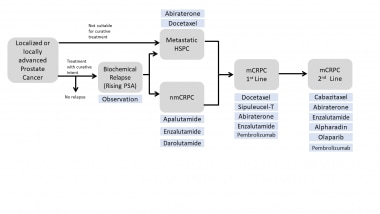The 9-Minute Rule for Best Prostate Cancer Doctor
The 9-Minute Rule for Best Prostate Cancer Doctor
Blog Article
Prostate Cancer Cells Therapy: Surgical and Non-Surgical Approaches Explained
When confronted with a prostate cancer cells diagnosis, the range of therapy choices can seem overwhelming. From surgical treatments to non-surgical approaches, each approach brings its very own set of benefits and considerations. The decision-making process includes weighing variables such as performance, prospective adverse effects, and lasting results. Comprehending the nuances of surgical techniques, like robotic-assisted surgery, and non-surgical treatments such as radiation therapy and hormone therapy, is vital for individuals and their family members. This extensive summary intends to clarify the complexities of prostate cancer therapy, offering insights into the details of each technique to empower people in making informed selections regarding their health.
Surgical Therapy Options
When considering medical treatment choices for prostate cancer, clients and health care carriers frequently consider the dangers and advantages related to different treatments. One common medical method is radical prostatectomy, which entails the elimination of the whole prostate gland. This procedure is often recommended for people with localized prostate cancer and provides the potential for a treatment. Nonetheless, extreme prostatectomy can cause adverse effects such as urinary incontinence and erectile disorder.
One more surgical alternative is robotic-assisted laparoscopic prostatectomy, a minimally intrusive procedure that makes use of a robotic system to help the surgeon in removing the prostate. This technique can lead to much less blood loss, shorter healthcare facility stays, and faster healing times compared to conventional open surgical procedure. Nonetheless, it additionally carries the threat of difficulties such as infection and injury to bordering body organs.
Ultimately, the option of surgical therapy for prostate cancer cells depends on numerous elements including the stage of the cancer cells, the individual's overall wellness, and their choices concerning possible negative effects and healing times. Consulting with a multidisciplinary group consisting of urologists, oncologists, and radiation oncologists can help clients make notified decisions regarding one of the most suitable medical technique for their individual instance.

Non-Surgical Therapy Options
Taking into consideration options to surgical treatments, non-surgical therapy choices for prostate cancer cells offer patients added methods for handling the condition while lessening potential surgical risks. One non-surgical technique is Energetic Surveillance, where people with low-risk prostate cancer cells are kept track of very closely via regular exams, blood examinations, and biopsies, without undergoing immediate treatment. This approach intends to avoid unneeded treatment and its associated side impacts, such as incontinence and erectile dysfunction.
One more non-surgical alternative is Radiation Treatment, which utilizes high-energy rays to eliminate cancer cells (best prostate cancer doctor). This treatment can be delivered on the surface utilizing an equipment (External Beam Radiation) or inside through tiny contaminated pellets put near the lump (Brachytherapy) Radiation treatment can be used as a key treatment or in combination with other therapies, such as hormone therapy
Additionally, Hormone Treatment is a non-surgical strategy that intends to minimize the levels of male hormones (androgens) in the body, as these hormonal agents can sustain the growth of prostate cancer cells. By blocking or lowering androgen levels, hormone therapy can reduce cancer development and alleviate signs and symptoms in sophisticated cases.
Robotic-Assisted Surgical Procedure for Prostate Cancer Cells

One of the essential benefits of robotic-assisted surgical treatment for prostate cancer is its ability to lower the danger of problems and side results frequently connected with open surgery, such as blood loss, discomfort, infection, and extended healing times. Overall, robotic-assisted surgery you can find out more stands for an advanced approach to prostate cancer therapy that incorporates technological improvements with surgical expertise to maximize patient results.
Radiation Therapy for Prostate Cancer Cells
Using sophisticated radiation technology, radiation therapy plays an important role in the detailed therapy of prostate cancer cells. Radiation therapy utilizes high-energy radiation to destroy cancer cells and shrink lumps. It is a typical therapy alternative for prostate cancer, either as a main treatment or in mix with surgery, hormonal agent treatment, or chemotherapy.
There are 2 main types of radiation therapy used for prostate cancer cells: external beam radiation therapy (EBRT) and brachytherapy. In EBRT, a device provides radiation from outside the body to the prostate. This therapy is typically provided over numerous weeks, with day-to-day sessions lasting just a couple of mins (Best prostate cancer doctor in Mumbai). Brachytherapy entails placing radioactive seeds or resources directly right into the prostate near the malignant cells. These seeds discharge radiation that kills the cancer cells in time.
Radiation treatment for prostate cancer cells is extremely efficient, with high treatment rates, particularly for local cancer cells. It is additionally an important option for individuals who may not be appropriate prospects for surgical procedure. Like any kind of therapy, radiation treatment may have adverse effects, such as urinary system problems, tiredness, and skin inflammation, however these are commonly short-term and convenient.
Hormonal Agent Treatment for Prostate Cancer
Hormonal agent treatment is a frequently used therapy approach for prostate cancer administration. Prostate cancer cells is often fueled by the man hormonal agent testosterone. Hormonal agent therapy, additionally referred to as androgen deprivation therapy, intends to minimize testosterone degrees in the body or obstruct the hormonal agent's impacts on the prostate cancer cells, therefore reducing the illness's development. This therapy is particularly effective in advanced stages of prostate cancer, where surgical procedure or radiation therapy may not be enough.
There are various kinds of hormone treatment for prostate cancer, consisting of medicines that lower testosterone degrees (such as luteinizing hormone-releasing hormonal agent agonists and villains), or medications that block testosterone from getting to cancer cells (like anti-androgens) Hormone therapy can be made use of alone or in mix with other therapies like radiation treatment, relying on the stage and aggression of the cancer.
While hormonal agent therapy can efficiently control prostate cancer cells development, it may include side impacts such as warm flashes, loss of libido, erectile dysfunction, and osteoporosis - best prostate surgeon in Mumbai. Normal tracking and discussions with health care providers are vital to take care of these negative effects and guarantee the treatment's efficiency
Verdict
In conclusion, the treatment choices for prostate cancer include non-surgical and surgical approaches such as robotic-assisted surgery, radiation treatment, and hormone therapy. Each strategy has its very This Site own benefits and risks, and the option of therapy depends on various elements such as the phase of cancer cells and general health and wellness of the individual. It is crucial for individuals to review these choices with their medical care copyright to figure out the most appropriate program of activity for their private circumstance.

Using innovative radiation innovation, radiation treatment plays a vital function in the thorough treatment of prostate cancer. It is a typical therapy choice for prostate cancer cells, either as a main therapy or in combination with surgical treatment, hormonal agent therapy, or radiation treatment.
Radiation treatment for prostate cancer cells is highly efficient, with high remedy prices, specifically Get More Information for localized cancer.Hormone treatment is a commonly made use of treatment technique for prostate cancer management.In verdict, the therapy options for prostate cancer consist of non-surgical and medical approaches such as robotic-assisted surgical procedure, radiation therapy, and hormonal agent therapy.
Report this page